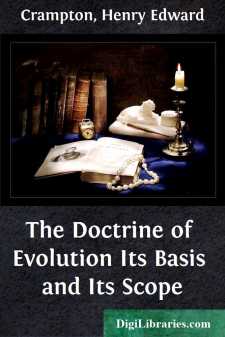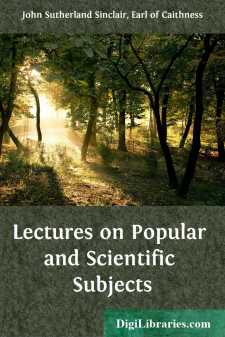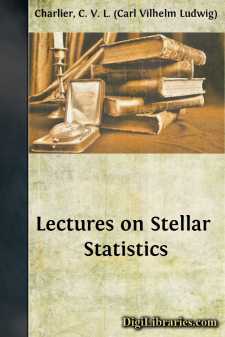Science
- Astronomy 18
- Biology 40
- Chemistry 13
- Electricity 1
- General 38
- History 6
- Light 1
- Paleontology 2
- Philosophy & Social Aspects 1
- Physics 3
- Relativity 2
- Study & Teaching 1
- Waves & Wave Mechanics 1
Science Books
Sort by:
In the course of the present year several foreign commentaries upon Mr. Darwin's great work have made their appearance. Those who have perused that remarkable chapter of the 'Antiquity of Man,' in which Sir Charles Lyell draws a parallel between the development of species and that of languages, will be glad to hear that one of the most eminent philologers of Germany, Professor...
more...
THE FUTURE OF ASTRONOMY BY PROFESSOR EDWARD C. PICKERING HARVARD COLLEGE OBSERVATORY It is claimed by astronomers that their science is not only the oldest, but that it is the most highly developed of the sciences. Indeed it should be so, since no other science has ever received such support from royalty, from the state and from the private individual. However this may be, there is no doubt that in...
more...
I EVOLUTION. THE LIVING ORGANISM AND ITS NATURAL HISTORY The Doctrine of Evolution is a body of principles and facts concerning the present condition and past history of the living and lifeless things that make up the universe. It teaches that natural processes have gone on in the earlier ages of the world as they do to-day, and that natural forces have ordered the production of all things about which...
more...
COAL AND COAL-MINES. There are few subjects of more importance, and few less known or thought about, than our coal-mines. Coal is one of our greatest blessings, and certainly one originating cause of England's greatness and wealth. It has given us a power over other nations, and vast sums of money are yearly brought to our country from abroad in exchange for the coal we send. Nearly £17,000,000...
more...
CHAPTER I. APPARENT ATTRIBUTES OF THE STARS. 1. Our knowledge of the stars is based on their apparent attributes, obtained from the astronomical observations. The object of astronomy is to deduce herefrom the real or absolute attributes of the stars, which are their position in space, their movement, and their physical nature. The apparent attributes of the stars are studied by the aid of their...
more...
CHAPTER I A DAY IN THE OBERLAND I am writing in early September from Interlaken, one of the loveliest spots in Europe when blessed with a full blaze of sunlight and only a few high-floating clouds, but absolutely detestable in dull, rainy weather, losing its beauty as the fairy scenes of a theatre do when viewed by dreary daylight. It is the case of the little girl of whom it is recorded that "When...
more...
CHAPTER I. EARLY OBSERVERS OF MARS. Few persons except astronomers fully realise that of all the planets of the Solar system the only one whose solid surface has been seen with certainty is Mars; and, very fortunately, that is also the only one which is sufficiently near to us for the physical features of the surface to be determined with any accuracy, even if we could see it in the other planets. Of...
more...
In controversy, as in courtship, the good old rule to be off with the old before one is on with the new, greatly commends itself to my sense of expediency. And, therefore, it appears to me desirable that I should preface such observations as I may have to offer upon the cloud of arguments (the relevancy of which to the issue which I had ventured to raise is not always obvious) put forth by Mr....
more...
There are three ways of regarding any account of past occurrences, whether delivered to us orally or recorded in writing. The narrative may be exactly true. That is to say, the words, taken in their natural sense, and interpreted according to the rules of grammar, may convey to the mind of the hearer, or of the reader an idea precisely correspondent with one which would have remained in the mind of a...
more...
by:
Asa Gray
These papers are now collected at the request of friends and correspondents, who think that they may be useful; and two new essays are added. Most of the articles were written as occasion called for them within the past sixteen years, and contributed to various periodicals, with little thought of their forming a series, and none of ever bringing them together into a volume, although one of them (the...
more...











